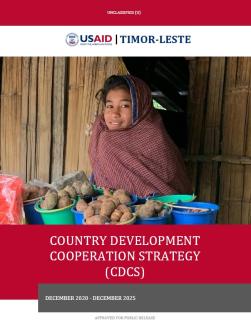Timor-Leste is at a crossroads. Buoyed by oil and gas wealth, Timor-Leste has the resources to lay the foundations for a democratic and prosperous future for all of its citizens, equipping them with the tools to climb out of poverty and stay there. The country also has the potential to fall victim to the pitfalls of over-reliance on oil-extraction, witnessed most recently by the collapse of global oil prices and supply chains during the COVID-19 pandemic. Timor-Leste has an opportunity to strategically invest its oil and gas wealth in human capacity development and build a robust and diversified economic future that provides for all generations to come. It is through this lens that USAID/Timor-Leste will pursue “An inclusive, prosperous, and healthy Timor-Leste that is more self-reliant” as its goal statement for the 2020-2025 CDCS.
Encompassing three ambitious themes - inclusiveness, prosperity, and health - this CDCS addresses areas that are essential to furthering self-reliance, from workforce development to business-enabling environment and greater government accountability. If adequate steps are taken to prepare the large, excluded population to participate in formal, public life, Timor-Leste will take advantage of a unique opportunity for growth, actively contributing to stability, and reinforcing its hard-earned peace. In line with the priorities for the Indo-Pacific region, this CDCS promotes prosperity and sovereignty rooted in broad-based economic growth that reaches all citizens. This CDCS invests heavily in building country capacity across the entire portfolio, with a particular focus on building citizen or human capacity. Inadequate health and education, and chronic poverty, are major roadblocks to building self-reliance. This CDCS recognizes this human capacity gap and will build skills throughout the portfolio so that all Timorese can live up to their potential. Through health systems strengthening and health governance, vocational education, skills training, and job placement, this strategy emphasizes a practical approach to human capacity building that will strengthen both the supply and demand for skilled labor, immediately generating impact among its beneficiaries.
Under this CDCS, USAID/Timor-Leste has strategically prioritized certain sub-dimensions and metrics from the Journey to Self-Reliance (J2SR) Country Roadmap (Economic Policy, Capacity of the Economy, Inclusive Development, Government Capacity, Citizen Capacity, Civil Society Capacity) for investment.1 The selection of these sub-dimensions and metrics reflect a mix of strengths and weaknesses from the Country Roadmap that together define the strategic areas which USAID/Timor-Leste believes are most important for building capacity and commitment to further Timor-Leste’s J2SR. Taken together, these metrics and sub-dimensions indicate that to further Timor-Leste self-reliance transition, USAID/Timor-Leste should strategically invest in programs that: 1) reform economic policy and build economic capacity for all people (especially women) so that all Timorese benefit from opportunities and build greater shared wealth and prosperity; and 2) improve government effectiveness, particularly as it relates to key public services, institutions, accountability, and transparency, including through CSO engagement. Several new trends and factors have guided USAID/Timor-Leste as it configures this new CDCS, making it vastly different from its prior strategy. First, the context has significantly changed. COVID-19 has badly affected the global economy, and national economies have deeply suffered from the collapse of supply chains, a lull in tourism, and an associated decrease in oil prices, upon which Timor-Leste depends for national revenue. This CDCS has fully taken into account the effects of COVID-19 on the Timorese economy and will leverage the newfound interest in economic diversification from the Government of Timor-Leste (GOTL) to make significant transformational changes in the business and policy environment. USAID/Timor-Leste will also capitalize on the GOTL’s awareness of COVID-19 to reinforce the resiliency of the health system so that it delivers for all in Timor-Leste.
Second, U.S. foreign policy objectives have shifted, including the priorities for the Indo-Pacific region and International Religious Freedom. In particular, the CDCS will invest in key Indo-Pacific priorities including advancing good governance, transparency, private sector growth, and natural resource management. Timor-Leste ranks low in religious tension and there are minimal risks or threats to religious freedom and ethnic minorities in Timor-Leste. Nevertheless, USAID/Timor-Leste will amplify existing efforts to advance religious freedom by helping ensure that religious minority groups can be preserved as distinct communities, and protecting and preserving the cultural heritages of religious communities. Lastly, new USAID tools and policies, such as the Journey to Self-Reliance, have shaped CDCS analysis and decision-making. USAID’s Journey to Self-Reliance policy and its associated Country Roadmaps have reframed the way in which USAID/Timor-Leste analyzes country progress and makes investment decisions.
With relatively modest investments, USAID will lay the foundations to ensure that all Timorese, particularly the most vulnerable, are able to reap the benefits of a nascent private sector and better governed Timor-Leste. If improvements to governance and the private sector are to remain sustainable and profit all segments of the populations, greater investments must be made to provide basic social services (including health) and improve overall government accountability and effectiveness, especially in terms of domestic resource mobilization. By the end of the CDCS period, USAID/Timor-Leste will have piloted the investments needed for a new, accountable, and transparent Timorese society that applies human capital and its comparative advantages to build a diverse and inclusive economy, rather than one that relies primarily on the oil and gas sector. Through this CDCS, USAID will lay the foundations for tomorrow’s self-reliant Timor-Leste.

